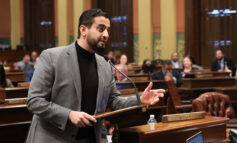Members of the Arab American community voiced their growing concerns regarding charitable contributions during a special town hall meeting on Tuesday, September 4, at the Henry Ford Centennial Library in Dearborn.
The meeting was arranged by BRIDGES and the office of U.S. Attorney Stephen Murphy, and hosted Michael Rosen, a Policy Advisor with the Office of Terrorist Financing and Financial Crimes, U.S. Department of Treasury. The purpose of the forum was to discuss ongoing concerns within the Arab American and American Muslim communities regarding the issue of charities. In the wake of the recent FBI raids on local Muslim charities, many community members are hesitant to donate even the smallest amount to any local charitable organization.
The meeting centered around an open discussion, where several key points pertaining to this issue were discussed. Many community members in attendance were vocal about their views on the issue, discussing topics ranging from transferring money overseas to almsgiving during the month of Ramadan.
Rosen spoke briefly to the audience about the position of his office on this issue before opening up the floor for discussion. He claimed that it wasn’t the intention of the Department of Treasury to discourage people from donating.
“I would like to stress the importance of charity and our common goal of protecting and promoting charitable giving,” he stated. “The U.S. as a whole is one of the most charitable, generous nations in the world. It is something we want to encourage, but we want to encourage it in a safe and appropriate way.”
Rosen acknowledged that many Arab Americans feel anxious about donating, in light of recent events. American-Arab Anti-Discrimination Committee (ADC) Michigan Regional Director and co-chair of BRIDGES, Imad Hamad, said that while this issue cannot be resolved quickly or easily, it is important to hold these discussions in order to maintain an open line of communication between the government and the community.
“Regardless of how much we agree or disagree on something, nothing should compromise the importance of this much needed dialogue,” said Hamad. “This type of debate is of great value and must be maintained. There continues to be great confusion and uncertainty surrounding this issue, which goes to show that we need to maintain this active engagement. We need to find an effective mechanism that will help the government and charities do their jobs, and allow donors to continue to practice this precious right.”
One thing that was evident during the meeting was the rising frustrations felt by the community as a whole. There are a large number of people in the Arab American community who desire to donate but are unclear on what guidelines to follow. The ambiguity of the current rules and regulations is cause for many to become increasingly fearful and mistrustful. Hamad claimed that a change in the system is necessary at this point, and would be advantageous to all parties involved.
“This gathering showed the necessity for certain procedures that go beyond the current guidelines,” he stated. “The presentation did not put anything new on the table. The problem with the guidelines we have is that they are vague and subject to change at any time. It is time for the governmental entities involved to step outside of the box and provide a clear mechanism regarding this issue. It is our common duty to find an appropriate way to handle it.”
Rosen emphasized the importance of individual donors doing research on an organization before donating to them. He claimed that the more literature an organization provides and the more open it is to answering candid questions, the less chance it will have to become subject to investigation. However, regardless of how careful a person is, the Treasury Department, or any other governmental entity for that matter, cannot grant assurance that a charity is particularly safe from being investigated or raided.
“We cannot give a blanket guarantee,” stated Rosen. “Our position is, we give guidance and hints, but in the end, the responsibility lies with the community, the charity, and the individual donor. The best defense is a community that is aware, engaged, and making smart decisions about donations.”
Rosen, who plans to make several more trips to Michigan as part of his work on this issue, spoke about charity training that the Treasury Department is currently working on. The training is specifically tailored for Muslim charities, and will attempt to provide them with ideas and suggestions relevant to their practices.





Leave a Reply